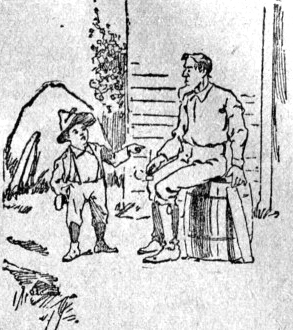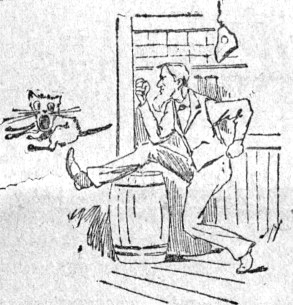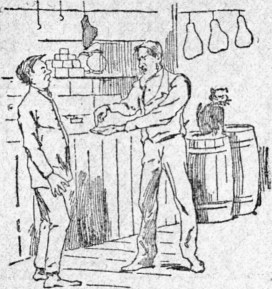putterings 416 < 417 > 418 index
chunks of justice
A Down Easter who knew where to lay the blame when anything went wrong.
A story which shows employers of labor how to fix the responsibility of business blunders.
An investment in bad flour which was turned to good account — “A Perfectly Just Man.”
[Written for The News.]
- A minister whom I knew long ago had two principal sermons, one from the text, “Mark the perfect man,” with which to turn the thoughts of his hearers in upon themselves that they might admire virtue; the other from the words, “But the wicked shall depart,” etc., to direct their attention upon one another that they might hate sin. He regulated his private admonitions by the same plan, and when he wished to teach a member of his flock the rudiments of equal and impartial justice to all he would sometimes relate the story of George W. Tanner.
- Tanner was a Yankee, and had had the regular bringing up of New England boys. Perhaps you don’t know what this is. If you don’t I’ll let you understand that it is not blithesome. No, sir; it is gruesome. The leading idea in the training of a boy up there is to “keep him down.” That’s what they call it, and the surest way for a boy to arrange for a whaling trip into the back cellar, with his father as the whaler, is to give the impression that he thinks he knows more than the head of the family. The boy asks his sire which one of me planets is nearest the sun, and the old gentleman takes chances and says Saturn. The boy reaches tor his astronomy, and his father reaches for a barrel stave, and the end of that boy is not peace. The retraction of Galileo is not a patch on it.

The Boy Arranges for a Whaling Trip.
- If the boy has any unfortunate peculiarities he hears of them. If he inherits them from his mother’s family, his father points them out to him; and if they come from the other side of the house, his mother’s relations deplore them in his presence. For instance, Tanner’s mother was a Mudget. The old man Tanner had a habit of carrying one shoulder higher than the other. So such of George W———’s aunts as were Mudgets would entice the boy into their presence with gingerbread that had been lying around the house till nobody would eat it, and then they would tell him that his right shoulder was too high, and that he was “just like the Tanners.”
- Then the boy would cry, and afterward he would try very hard to bring his left shoulder up to the level of the other, because the conversation had convinced him that there must be something disgraceful about the Tanners, and he had resolved not to resemble them any more. In reality his shoulders were all right to begin with, but by persistently hitching up the left one in deference to his aunt’s opinion, he at last succeeded in making himself permanently one-sided, and thus afforded much gratification to the Mudgets.
- A Down East boy is always to blame, even for having red hair. This course of treatment is supposed to make him modest, but the effect which it really does produce is illustrated by the case of Tanner. At the age of 25 he inherited a grocery and general store, with a fair business. He employed a couple of clerks, a bookkeeper, and, for three months in the year, several men to drive wagons and deliver goods of an inferior quality to people who kept summer boarders in the town and its vicinity. George was not a good business man, and his mistakes were frequent and costly.
- For instance, he bought a lot of flour on the representations of a traveling salesman and it turned out to be he worst flour that had ever been seen in Goose Falls. Bread made of it coudn’t be raised with a derrick. “My sour milk biscuit last night was hard enough to scratch glass,” said old Miss Nutter, “an’ me that can make biscuits a that’ll melt in yer mouth.”
- What did George W. Tanner do? Did he chew his whiskers and kick himself for buying that flour? Did he, on the contrary, try to deceive himself into the belief that no mistake had been made ? Not by a jugfull. He called Cyrus J. Perkins, his head clerk.
- “Cyrus,” said he, “ye made a thunder’n fool o’ yerself when yer bought that flour.”
- “Mr. Tanner,” said Cyrus, “I never knew —”
- “It’ll cost me many a dollar,” continued George, “and if you’d a-had half wit y’ou’d a seen it from the first. Why didn’t ye try some of it? Why didn’t yer order a barrel or two ?”
- “Mr. Tanner,” said Cyrus, “I never had nothin’ ter do —”
- “What possessed yer to go an’ fill the store with that stuff that ain’t no more fit ter make bread with than so much blue clay off er the north shore er Nigger island? I’ll have ter take it out er yer pay.”
- “Mr. Tanner,” protested Cyrus, “I never even seen the feller what sold —”
- “There, there,” said Tanner, “don’t say no more about it. Yer mate a mistake an’ that settles it; but if yer can see any way ter git rid of the stuff I’ll let yer keep yer place.”
- Then Cyrus went out into the back store and kicked himself, and George was saved the trouble. Moreover, Cyrus made a trade with a captain that was just sailing for the West Indies, and sold him the flour for a little better than cost. The cook made some bread off Hatteras and it sunk the schooner with all hands, so that Tanner never had any more complaint about the flour.
- Tanner’s store was in a double house and he owned it all, though he occupied but half. The other half was rented to Abe Willis, who did a little puttering business, selling coffins, canned clams and confectionery. By and by Willis died from eating the clams and was buried in the only coffin in the shop — for he made them to order, and never kept any in stock, except one with a glass top, which he used as a show case for the confectionery. After he was gone there was nothing left but the candy, and no place to put that in, so his widow ate up what little there was, in order not to waste it, and then closed out the business.
- So Tanner, having the property in his hands, leased it at a very low rental for ninety-nine years to a fellow from the lower end of Pumpkin island. This enterprising young man immediately opened a grocery and general store just like Tanner’s, and began to sell a quarter of a cent cheaper the first day.
- Things looked pretty bad for Tanner, and the worst of it was that if he hadn’t rented the shop the man from Pumpkin island couldn’t have found any other place in Goose Falls fit to do business in.
- “I would bounce any man for doing such a fool trick as that,” said George; “yes, sir; I’d bounce him if he had a wife and seven children depending on him.”
- This naturally led him to remember that George Blake, who was driving a wagon for him that summer, had a wife and seven children. He called him in.
- “George,” said he, “why in blazes did yer rent that shop to that clam-diggin’ pirate Irom Pumpkin island?”
- “I never done it,” drawled George.
- “Didn’t yer know,” continued Tanner, “that lantern-jawed son of a sea cow’s ghost would set up a grocery store?”
- “I didn’t know nothin’ —” George began.
- “No, yer didn’t know nothin’,” said Tanner, “and yer never will. That’s what’s the matter with yer.”
- Then he went over the whole transaction, showing George why it was the most preposterous thing that was ever done, or even suggested outside a lunatic asylum. And he wound up by discharging George for doing it.
- But that didn’t help him any, for Blake, who was really a valuable man, took service with the enemy and cut into Tanner’s trade very deep. Then Tanner discharged Cyrus Perkins for discharging Blake. Things got into a bad way in the store. Tanner discharged the other clerk for not taking Cyrus’ place in waiting on customers.
- “But I did, Mr. Tanner,” said the young man.
- “Then yer must a-left yer own place vacant,” said Tanner. “I’ll bounce ye for that.”
- And so it went on. The principal difficulty with Tanner was that he persisted in superintending all the work that was done in the store whether he understood it or not. He ordered the boy to build the fire in the egg-shaped coal stove in a certain way; and the final abode of the wicked would be stone cold before night if it were treated that way in the morning. Then Tanner bounced the boy for letting the fire go out. One night Deacon Hudnut dropped into the store just as Tanner was going out. They sat around there for three or four hours playing old sledge for the money in the drawer; and in the morning Tanner bounced the bookkeeper (who was also clerk and boy) because his cash was $6.40 short. At last Tanner kept shop with the assistance of an old and faithful cat, and he kicked Thomas out of the store every night because business was bad; but the patient beast crawled in by a back window, and was on hand every morning.

The Old and Faithful Cat Is Kicked Out.
- Tanner was sometimes asked why he acted that way. And he always replied: “I’m a perfectly just man. When I was a boy I was blamed for the faults of others — principally them that I took arter in looks an’ stupidity. Now, that I’m a man, it’s no more’n fair that other folks should be blamed for what I do. How’m I goin’ to get square any other way?”

“No More’n Fair Others Sh’d Get Blame.”
- It seems to me that this argument is logically unanswerable, and, at any rate, it shows the value of bringing up children by precept and example, that they shall have a trained sense of justice and personal responsibility, as Tanner had. Then, too, his doctrine applies to those who, having worked for $7 a week during early manhood, are employing others to work for them at $6.50. I would have every such person consider Tanner’s argument, and if he is disposed to give an employe the key to the street and tell him to go out and eat snowballs on the edge of a hard winter, why, let him do it by all means. It certainly is one way of getting square.
Howard Fielding, “Chunks of Justice,” in The Rocky Mountain News 34, (December 11, 1892)
via the (wonders-full) Colorado Historic Newspapers Collection :
link
![]()
Howard Fielding was the nom de plume of Charles Witherle Hooke (1861-1929)
wikipedia : link